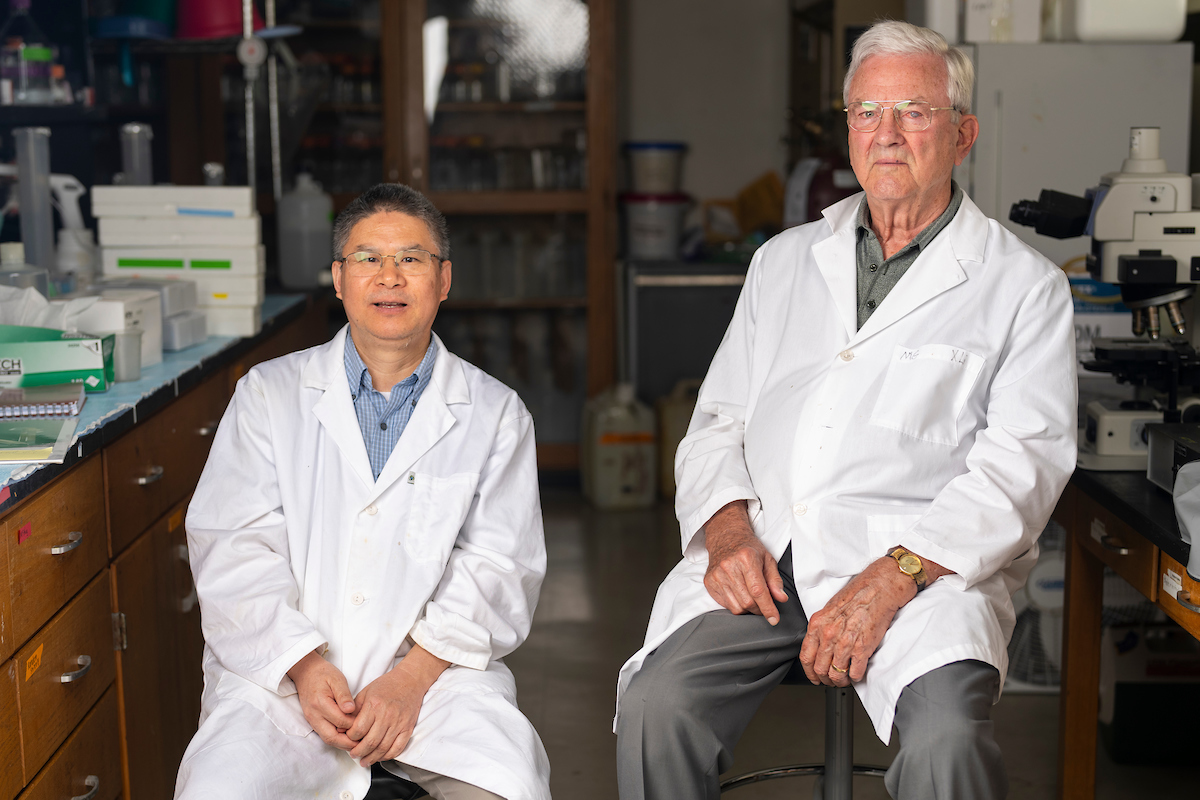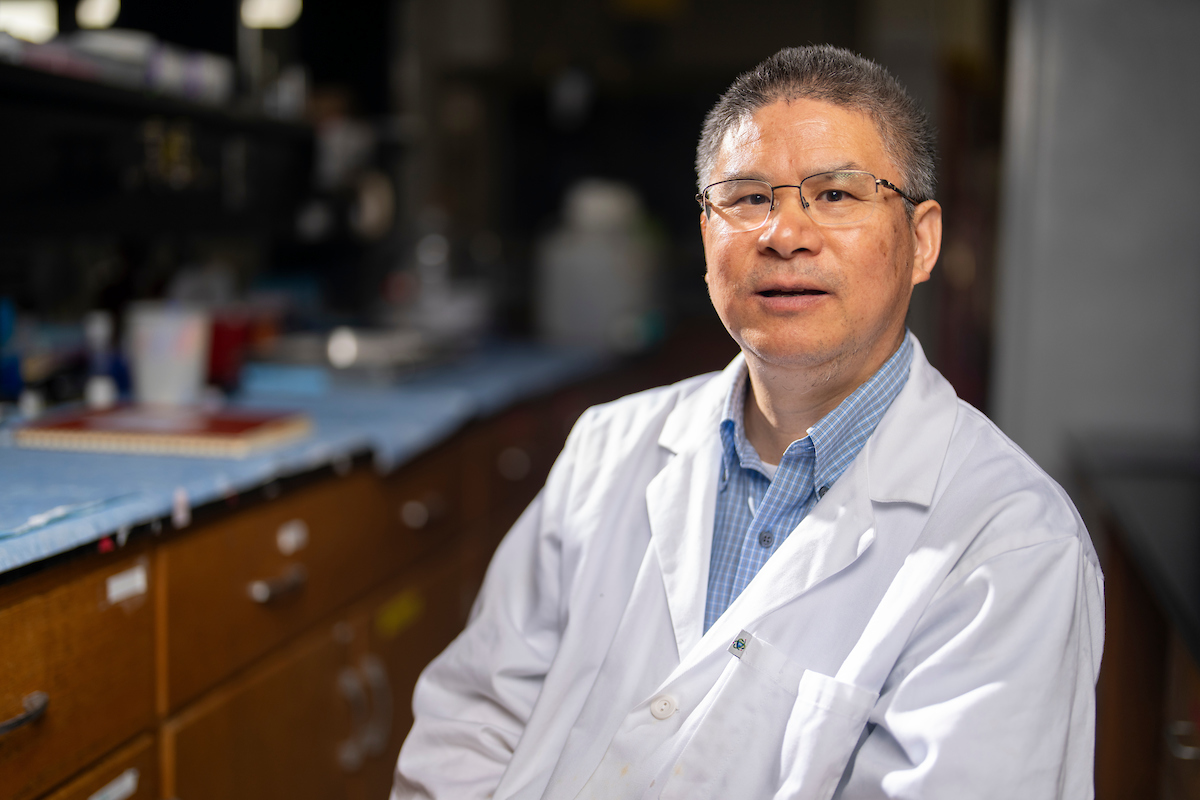Texas A&M AgriLife home to world’s top animal science researchers, according to Research.com
Fuller Bazer and Guoyao Wu ranked No. 1 and No. 2 in the world for animal science research
Texas A&M College of Agriculture and Life Sciences Department of Animal Science and Texas A&M AgriLife Research faculty have secured the No. 1 and No. 2 spots in the most recent edition of Research.com’s ranking of the best scientists in “Animal Science and Veterinary.”
Fuller Bazer, Ph.D., is highlighted as the top researcher in the world in the ranking with a D-index of 132. Ranking at spot No. 2 in the world is Guoyao Wu, Ph.D., with a D-index of 131. The two have independently and collaboratively led the way in determining how nutrients such as amino acids, metabolites like lactate and signaling proteins are essential for optimal growth, development and health in both animals and humans.

“Drs. Bazer and Wu are shining examples that the Texas A&M Department of Animal Science has world-class faculty,” said Jeffrey W. Savell, Ph.D., vice chancellor and dean for Agriculture and Life Sciences. “I’ve had the fortune to work with these colleagues for decades. Their research endeavors help Texas A&M remain the preeminent leader in animal science education and research, nationally and internationally.”
AgriLife Research supports College of Agriculture and Life Sciences tenure and tenure-track faculty. G. Cliff Lamb, Ph.D., director of AgriLife Research, said the agency is glad to support Bazer and Wu’s research portfolios and is honored by this recognition, which is based on research outputs of high-impact publications and citations.
“Dr. Bazer’s research in pregnancy establishment of livestock species has had significant impacts on production efficiency of all livestock species,” Lamb said. “Dr. Wu’s work in amino acid nutrition has revolutionized dietary changes for livestock species that improve survival and productivity. We are proud of their contributions to science.”
Inspiring the future of animal science research
In releasing the list, Research.com states, “Our aim is to inspire researchers, businessmen and politicians worldwide to explore where top experts are heading and to give an opportunity for the whole research community to discover who the leading experts in specific disciplines, in various countries or even within research institutions are.”
Clay Mathis, Ph.D., head of the Department of Animal Science, said the department’s mission is to be the first choice of prospective undergraduate and graduate animal science students seeking the best animal science education, and of employers seeking the brightest and best-prepared animal science graduates.
“This is confirmation we are employing the best in our faculty researchers,” Mathis said. “We strive to deliver cutting-edge scientific tools and innovative solutions, not just for Texas producers but as a leader in animal science to the world. We are proud of our faculty for being recognized for their advancement of animal science.”
The listing is created using data consolidated from a wide range of data sources, including OpenAlex and CrossRef. The bibliometric data for estimating the citation-based metrics were collected on Nov. 11. Position in the ranking is based on a scholar’s discipline H-index or D-index, which only includes publications and citation values for an examined discipline.
Bazer’s discoveries change animal management during pregnancy
Bazer, a Regents Fellow, Distinguished Professor and the O.D. Butler Chair of Physiology and Reproduction, is an international leader among reproductive biologists in animal sciences and related disciplines.
He is credited with discovering uteroferrin, a phosphatase produced in response to progesterone that transfers iron to the developing embryo and stimulates blood cell and platelet development. This discovery clarified the biological mystery of signaling between embryo and mother to maintain pregnancy, with profound effects on the efficiency of animal production systems.

He also discovered estradiol as the pregnancy recognition signal from swine conceptuses and interferon tau as the pregnancy recognition signal from ruminant conceptuses. These and related discoveries have changed animal management to increase conceptus survival and pregnancy.
Bazer is a past recipient of the Morrison Award from the American Society of Animal Science, Hartman Award from the Society for the Study of Reproduction, Marshall Medal from the Society for Reproduction and Fertility, and the Wolf Prize in Agriculture for his Interferon tau discovery as well as other pregnancy-associated proteins.
He is also a Fellow of the American Association for the Advancement of Science, and a recipient of the L. E. Casida Award and the Animal Physiology and Endocrinology Award, both from the American Society of Animal Science, and awards for research, graduate education and service from the Society for the Study of Reproduction.
Wu connects amino acids and proteins to fetal and postnatal development
Wu, a University Distinguished Professor, University Faculty Fellow and AgriLife Research Faculty Fellow, also holds appointments with the Department of Nutrition, the Department of Medical Physiology and the Department of Veterinary Integrative Biosciences.

His animal science research focuses on amino acid biochemistry and nutrition, including the arginine-nitric oxide pathway, as well as the syntheses of the arginine family of amino acids and glycine in mammals, birds and fish.
His research in glutamine intersects with topics in cell signaling, gastroenterology, necrotizing enterocolitis, parenteral nutrition and taurine. His amino acid research incorporates elements of threonine, lactation and microbiology.
Wu discovered metabolic pathways for the synthesis of amino acids and polyamines that are essential for animal growth, development, reproduction and survival. He also proposed two seminal concepts in nutrition — functional amino acids and dietary requirements of animals for traditionally classified “nonessential” amino acids — that transformed the feeding of livestock, poultry and aquatic animals worldwide.
Wu is the recipient of the Research.com Animal Science and Veterinary in U.S. Leader Award for the past two years, the Research.com Best Scientist Award, the Morrison Award from the American Society of Animal Science, and the Top Agri-food Pioneers award from the World Food Prize Foundation.
He is also a Fellow of the American Association for the Advancement of Science and has received the American Feed Industry Association/Federation of Animal Science Societies New Frontiers in Animal Nutrition Award and the American Feed Industry Association Award in Nonruminant Nutrition Research.





